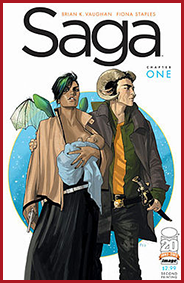SAGA (Volumes One and Two)
Brian K. Vaughan (Writer) / Fiona Staples (Illustrator)
ISBN 978-1-60706-601-9 / ISBN 978-1-60706-692-7
So even if you pretty much have your head stuck in the literary clouds and barely come down from the Mount Olympus of the Booker short list each year you are probably aware of graphic novels like Sandman and Maus. You might even be aware of Fables by Bill Willingham and Y the Last Man by Brian K. Vaughan.
But all of those are old titles now. Even Fables, though it is still ticking along, has been ticking along for some years. So you might ask, what are the cool kids reading right now? Saga. Written by Brian K. Vaughan and illustrated by Fiona Staples and published by Image, Saga is quite possibly one of the best comics of the last decade. One of the great delights of the exploratory comic fringes is that the medium still takes real risks with conventions and received notions of world, character and story. If you want to know what will be in the movie theatres ten years from now, go read the comics that are being printed right this week. Comics move ahead of the pack like no other form of storytelling. If you think that magic realist thing that some fiction author did this year was deeply original, probably it was done in the mid-eighties in a horror comic line or something. Probably, Alan Moore did that clever thing so long ago even he doesn’t remember doing it any longer.
So what is Saga and what is it doing that is so amazing? Brian K. Vaughan’s story is a strange science fantasy story in which two hyper-advanced civilisations are fighting a war so vast that it takes in the whole galaxy and so pointless that it doesn’t seem very far removed from an never-ending tribal payback. Twisted into this story are shimmering beautifully realised politics, plots and tricks of story, but what really sets Saga apart are the characters. It’s impossible not to fall in love with Marco and Alana, the two protagonists and lovebirds (or maybe love-beetle and a love-goat is more to the point?). It’s impossible not to be charmed with a comic about war and peace and pacifism and hope where the writer has the nerve to start with an honest birth complete all its blood and umbilical cords and screaming and two new parents just trying to work out what to do next. And all of the supporting characters are just as deeply emotionally realised as Marco and Alana. They don’t necessarily start that way, but they get there with time, which is just one more little authorial trick. You think someone is a two-dimensional villain… only they’re not. You think someone is just a bit of comic relief… only they’re not. Further, it’s taken me a while to work out exactly why everything just seems to click so well… but I think that whereas a lot of gritty, realistic fiction tries to show you that there are no good or evil sides of any fight, but that everyone is a little bit good and a little bit evil, Saga really feels as if it is saying that, no, actually, that’s not quite right either, and everyone (or nearly everyone) is basically a good person. People might have motivations that lead them to do evil things, but those things haunt a person. In an age of cynicism, there is something really enchanting about a story that seems to be asking do we really want to live in a world where good people feel forced to do really bad things?
Finally, I can’t finish off the review without also pointing out that Fiona Staples artwork is utterly enchanting and her verve with character expression and poise adds a depth to the characters that the text alone would not and could not capture. Comics are a collaborative effort and the best of them happen when an extraordinary comic script meets and extraordinary comic artist. That has happened with Saga and the result is quite simply magic.


